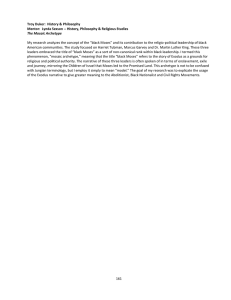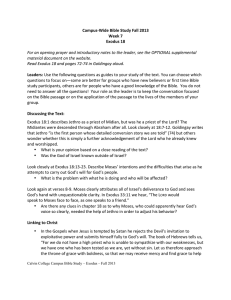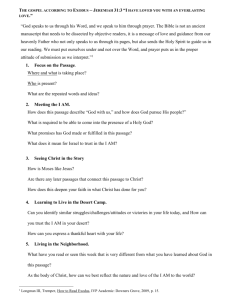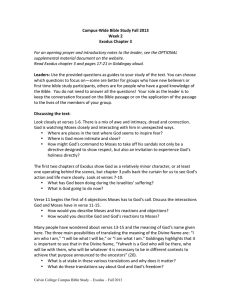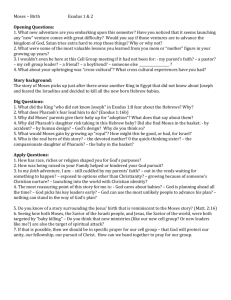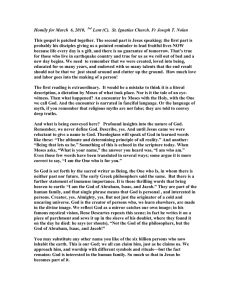Document 14396640
advertisement
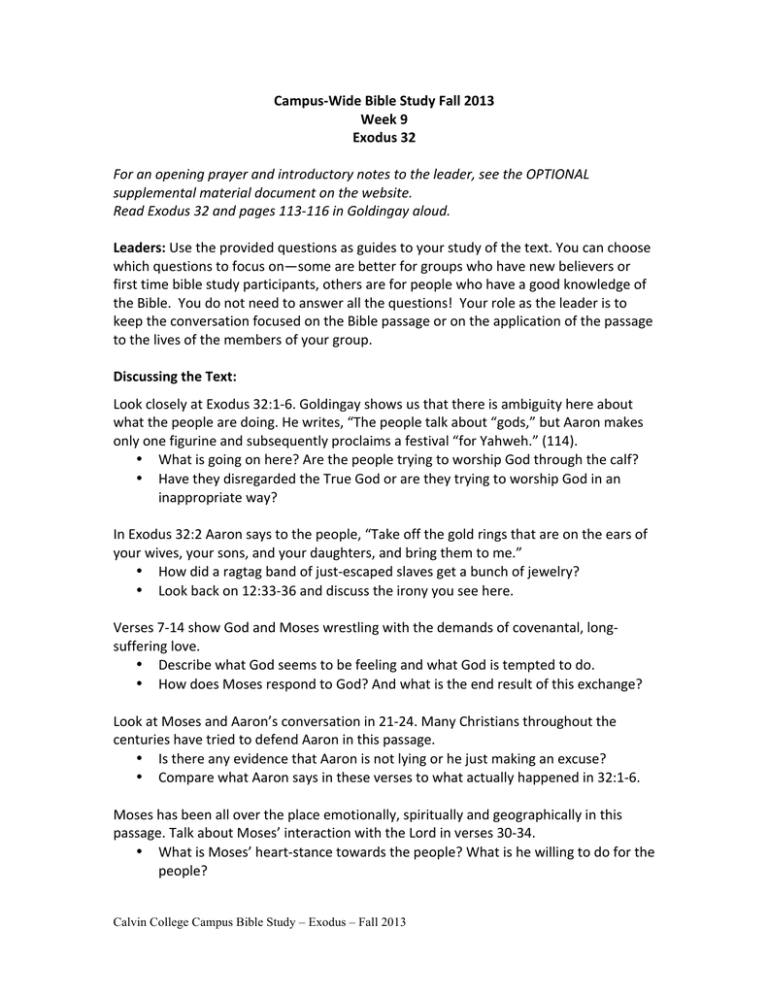
Campus-­‐Wide Bible Study Fall 2013 Week 9 Exodus 32 For an opening prayer and introductory notes to the leader, see the OPTIONAL supplemental material document on the website. Read Exodus 32 and pages 113-­‐116 in Goldingay aloud. Leaders: Use the provided questions as guides to your study of the text. You can choose which questions to focus on—some are better for groups who have new believers or first time bible study participants, others are for people who have a good knowledge of the Bible. You do not need to answer all the questions! Your role as the leader is to keep the conversation focused on the Bible passage or on the application of the passage to the lives of the members of your group. Discussing the Text: Look closely at Exodus 32:1-­‐6. Goldingay shows us that there is ambiguity here about what the people are doing. He writes, “The people talk about “gods,” but Aaron makes only one figurine and subsequently proclaims a festival “for Yahweh.” (114). • What is going on here? Are the people trying to worship God through the calf? • Have they disregarded the True God or are they trying to worship God in an inappropriate way? In Exodus 32:2 Aaron says to the people, “Take off the gold rings that are on the ears of your wives, your sons, and your daughters, and bring them to me.” • How did a ragtag band of just-­‐escaped slaves get a bunch of jewelry? • Look back on 12:33-­‐36 and discuss the irony you see here. Verses 7-­‐14 show God and Moses wrestling with the demands of covenantal, long-­‐ suffering love. • Describe what God seems to be feeling and what God is tempted to do. • How does Moses respond to God? And what is the end result of this exchange? Look at Moses and Aaron’s conversation in 21-­‐24. Many Christians throughout the centuries have tried to defend Aaron in this passage. • Is there any evidence that Aaron is not lying or he just making an excuse? • Compare what Aaron says in these verses to what actually happened in 32:1-­‐6. Moses has been all over the place emotionally, spiritually and geographically in this passage. Talk about Moses’ interaction with the Lord in verses 30-­‐34. • What is Moses’ heart-­‐stance towards the people? What is he willing to do for the people? Calvin College Campus Bible Study – Exodus – Fall 2013 Linking to Christ • In Exodus 32 Moses tries to sacrifice himself for the good of the people, but God rejects his offer. The New Testament teaches that Christ has cleansed and empowered us through his death – and that God has forgiven us through Christ’s sacrifice. Discuss the following quote from the Heidelberg Catechism Lord’s Day 23 Question 60 and compare and contrast Moses’ mediation with Christ’s. Discussing the World Q 23. How are you righteous before God? A 23. Only by true faith in Jesus Christ. Even though my conscience accuses me of having grievously sinned against all God’s commandments, of never having kept any of them, and of still being inclined toward all evil, nevertheless, without any merit of my own, out of sheer grace, God grants and credits to me the perfect satisfaction, righteousness, and holiness of Christ, as if I had never sinned nor been a sinner, and as if I had been as perfectly obedient as Christ was obedient for me. All I need to do is accept this gift with a believing heart. Exodus 32:4 has the people of Israel saying about the golden calf, “These are your gods, O Israel, who brought you out of the land of Egypt!” After all they have been through they forget that it was Yahweh who delivered them and told them not to make statues to worship. • When do you have a hard time remembering that God is your redeemer? • When do you forget about God and God’s care? • What helps you to remember who God is and what God has done and is doing? Goldingay writes, “In prayer we are like children begging our parents to do what we want. Sometimes children fail in such attempts, but sometimes they succeed. Significantly, however, Moses is not praying for himself but for the people, and he is praying about God’s honor” (115). Interact with this quote. • What does this story of Moses’ prayer tell us about God and prayer and our desires? Perhaps drawing on a not too embarrassing episode, or perhaps on a really embarrassing one, when have you been caught red-­‐handed like Aaron? • How did you respond? How did God’s grace meet you? Talk about a time when have you been willing to suffer for the people you love. How did God prepare you for that level of selflessness? Calvin College Campus Bible Study – Exodus – Fall 2013
